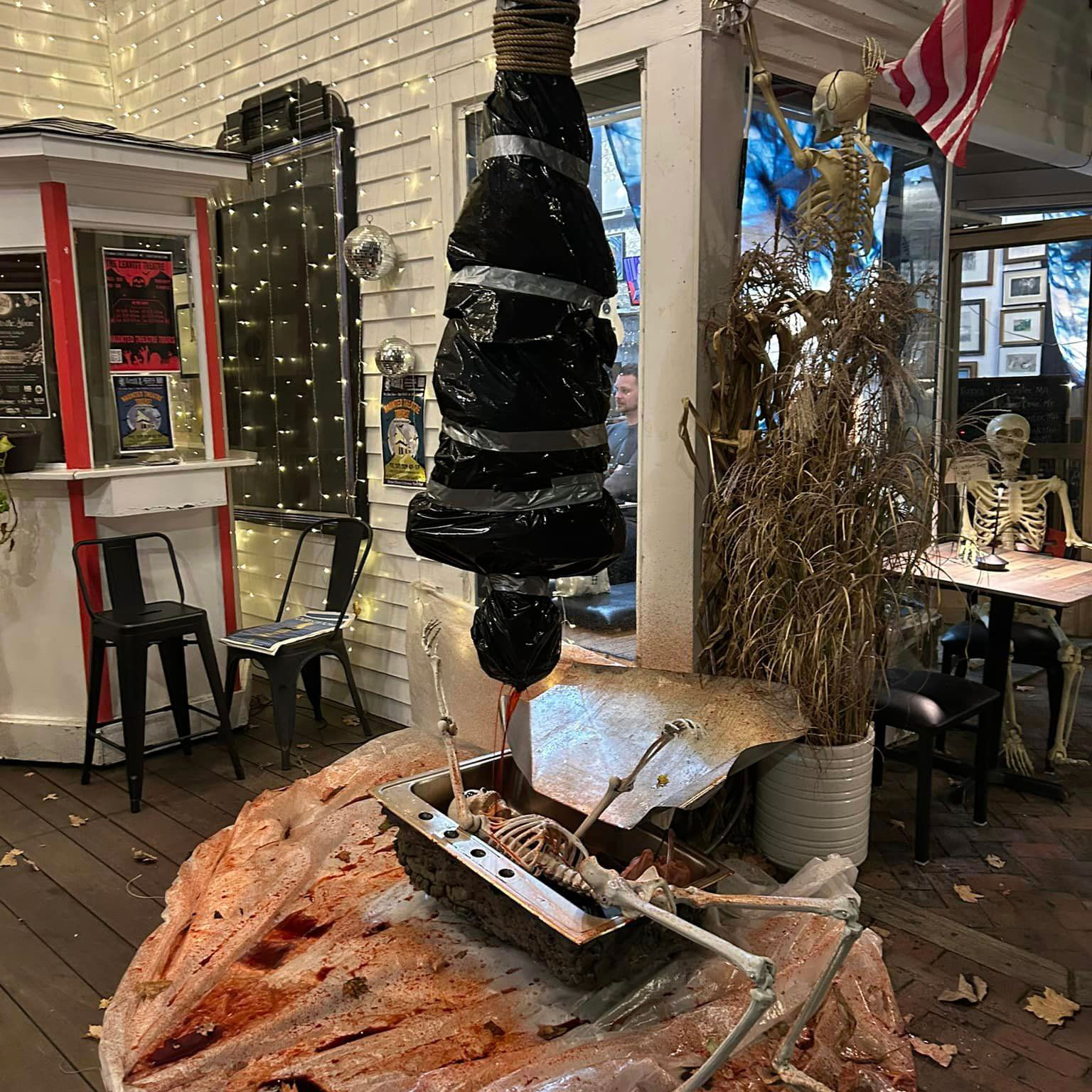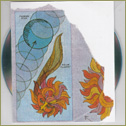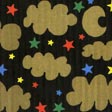During the late '90s, London-Tokyo harsh noise unit Noise/Girl became one of the Japanoise underground's most respected live performers, and renowned for a denser and more complex sound than most contemporaries. Suddenly in 2000, Noise/Girl disappeared. After four years missing and presumed dead, frontman Lucifer has resurfaced with live performances and a CD full of new tracks and unreleased material.
Trevor Brown, a fellow British ex-Patriot in Tokyo, has provided the cover artwork n a signature adorably unsettling illustration. Trevor is known for his fetishistic, unavoidable, brutally disturbing, and highly collectible covers for John Zorn, Dead Pop Stars, Jarboe, Merzbow, GG Allin, Coil, Supersuckers, Brighter Death Now, Whitehouse and Venetian Snares. At 500 copies, the supply of Discopathology will not last long.
This CD is the final epitaph and culmination of Noise/Girl: a super-heavy noise album that you can also boogie to. Deep, harsh, psychedelic noise engulfs disco and funk, which has somehow traveled through the looking glass and into another dimension of howling feedback and brutal bass frequencies.
Featuring some tracks to dance to, some tracks nobody in their right minds would try to dance to, and a remastered version of the legendary 12" single "Discopathology," described by the NME as "a terrifying record n deserves to be a big-room floor-filer...immortality beckons."
The Discopathology CD is loud and harsh enough to satisfy fans of Merzbow or Whitehouse, complex enough to reward repeated listenings, and most unexpectedly of all: it is booty-shakingly funky.
reviews:
Beginning with "Before the Carnival," an uneasy wash of reverb and distortion that is cautiously subdued. The lull explodes into the title track, a rampaging equalizer-killing disco dance anthem. This is where Noise/Girl shines; the mix is clear with high attention to detail. Unlike many of his noise contemporaries, Noise/Girl embraces frequencies across the spectrum, and assigns pockets of the spectrum to various elements of the mix. If Daft Punk traded their skill with the filter-bank for brutal distortions, the result would bow before the dynamics of Discopathology. This shit makes your ass move. Harsh noise has never been so fun. The album progresses with sequential lulls and "dance" songs, ripping samples and themes from well-known tracks, such as "Alive," which bastardizes the classic "Staying Alive." The beats behind the brothers Gibb are thick and unforgiving, relying on a throbbing kick augmented by squealing oscillators. Noise/Girl isn't going to hit the Top 40 any time soon, but the smirk and nod to pop sensibilities found within Discopathlogy lies woven within the power noise eclipses of many stars. - Matt Simpson, Igloo
ouch - WFMU
Even though it's relatively tame by Brown's own fetishistic standards, it's obvious that Noise/Girl aren't expecting this career round-up to be taken into the all encompassing motherly breast of the Wal-Mart family. From the cover art to the song titles and label name it's obvious that the band aren't down with the doom in any serious form; a frontman with the name Lucifer hardly instils fear into the hearts of men in 2005. Having disappeared from view in 2000, this single release is all that's left to sum up the Noise/Girl experience with the project having now come to an official end. The band's greatest talent might well be in the little known field of messed up disco-industrial, but they also more than adequately insinuate themselves into other aural areas after giving them a brush with the white noise wand. The manipulation of funk, black metal soundscapes, rock, and straight up noise means that Discopathology is more than the sum of its separate constituent assaulted and dazed elements. In an expert example of tension building there's a chilling opening track that skirts between something happening down the end of a long dark tunnel and waves of extreme static racing from the speaker. It's this slow bleed that opens the door for a run of relatively palatable but harsh noise, and there's a distant element of both the Mary Chain's Nineties experiments with beats and the now-pointless but once-mighty DHR. Frontloading this LP with the less unsympathetic tracks makes for a less problematic listen for those of a nervous disposition, especially with the swarming pvc hipped title track, which carves out some diva vocals and wah-wah squelch from an imaginary floor filler and then drowns them beneath the swell and heavy tread of the sweatiest shittiest PA club drums. The whole effect is glorious and demands high volume, stimulants, glitter, and blood as recognisable parts briefly break the surface of sound. This trick of adding killer elements of dance music to a swamp of noise (or vice versa) is repeated and rejigged on both the ruff white Junglist mugging of "Smoke 'N' Mirrorz" and the Whitehouse / Bee Gees mash-up of "Alive." This song's squall of looped rock guitar is the most commercial cut here, lying pinned down by a pounding fuck beat and belongs on either NiN's Broken or in the crack fuelled leather clad comedy pantomime of Revolting Cocks. Things become a little detached throughout the more chaotic pieces, wherein the only lightness of touch comes from the hair metal-inspired song titles. Perhaps the LP's finest moment is the demented live take on the soundtrack to Michael Jackson's screaming inner world entitled "King of Pop." If there is a Jackson sample in there it's so damaged, bleached black, and crushed that no copyright lawyer will ever find a big enough trace anyway. It's as insensitive and hard as any Hair Police sonic beating and provides as clear and as full a picture of Jackson's mental health as anyone will ever need to ever mosh along to. - Scott McKeating, Stylus
While I'm hardly the world's foremost noise authority, I suspect Noise/Girl's Discopathology might represent some kind of noise nirvana for aficionados of the genre. Tailor-made to single-handedly incinerate disc players and stereo systems throughout the globe, the disc is a seething forty-minute wail of feedback squall that makes Merzbow sound like John Denver. Noise/Girl, which had made a name for itself within the Japan noise community during the late '90s, disappeared suddenly in 2000. The group's figurehead Luke Cypher recently resurfaced with live performances and a 'final update' of new, rare, and unreleased material issued by Brainwashed on its Killer Pimp label. Peel back the eight pieces' decimating howls and squeals and you'll actually catch faint traces of tribal gabba ("Alive"), breakcore ("Smoke 'N' Mirrorz"), and, yes, even disco ("Discopathology"). Though "Before the Carnival" initiates the album spookily, it's not overly threatening or overwhelming. But gradually the distant screams and whistles escalate into a wave of rippling noise that's awesome in its engulfing magnitude. The title piece then roars in, a gargantuan, bulldozing booty-shaker that flails, screeches, and twitches convulsively yet--unbelievably--is a mere teaser for the merciless onslaught ahead: "Honeyfunk," an insane hailstorm of brutal blasts and violent ruptures. If nothing else, one must at least admire the band's perverse sense of humour: it very well may be Michael Jackson's voice that wails from the depths of the cauldron that is "King of Pop," for example, but it's impossible to tell when it's buried under an avalanche of noise and, needless to say, "Alice in Boogie Wonderland" won't be played at your local dance club any time soon. Fearless masochists eager to brave the trip might want to know that only 500 copies were issued. - Ron Schepper, Textura
He goes by the name Lucifer and he makes a noise that'll stand out among every other noise album in just about anyone's collection. Throbbing Gristle was as much concerned with beats as they were with confrontation and the Noise/Girl project takes that premise a step forward. This is noise for dancing, at least in part, and it's noise that loves chaos in a way that only Satan possibly could. Lucifer's noise is part drone, a layered, demented noise full of psychedelic effects and hazy textures all of which tend to reach a critical velocity before ending. His dance tracks, on the other hand, are just that. It's impossible to resist his dance floor oriented beats, pounding away like a war drum beneath sharp, swirling effects and heavy static. When "Discopathology" hits it's a bit of a surprise. Lucifer doesn't hold back, utilizing compressed melodies, unintelligible vocal samples, and all manner of cut-up blast rhythms that build and build to an orgasmic level, pumping like a well-oiled machine. It's hard not to think of Nitzer Ebb or any of the dance-industrial giants that made similar, but significantly less energetic music than this. It's also hard not to imagine a factory with innumerable gears, gaskets, engines, and cranks moving in perfect time. The first half of the album is prodigiously funkier and voluptuous. "Alive" amounts to the complete destruction of the Bee Gees, a sacrificial burning of their trademark vocals and disco style. A tense reworking of the melody from "Stayin' Alive" is countered by Lucifer's start and stop dynamics. It's an audacious track, especially on a noise album like this one. It might turn a lot of purists off, but it adds a world of dimension to the album, one that is altogether harsh and uncompromising. As the album comes to a close, Lucifer turns the darkness factor up about ten notches, increasing the intensity of his feedback blasts or manipulating the mood of the entire track by incorporating deeper groans and hinting at rhythms somewhere in the distance. Trevor Brown's fantastic artwork fits the mood of the album perfectly. The nurse with her open legs might suggest some kind of welcome gesture, but it'd be the most insane kind of sexual adventure. Lucifer similarly opens this album up for the noise uninitiated and then proceeds to crush everyone and everything sucked in by his whirling mania of dancing feet and chainsaws. - Lucas Schleicher, Brainwashed



 Auto Da Fe use a number of exotic instruments with pleasant, albeit mostly straightforward results. The singing, however, immediately reminded me of class field trips to the Renaissance Fair, an association I unfortunately couldn’t shake throughout the course of the album.
Auto Da Fe use a number of exotic instruments with pleasant, albeit mostly straightforward results. The singing, however, immediately reminded me of class field trips to the Renaissance Fair, an association I unfortunately couldn’t shake throughout the course of the album. Taking a side step from his series of numbered Astral Social Club volumes, Neil Campbell drops a quick two track smack round the head. Recorded live in April 2006, this may be titled after a bolt from the heavens but it‚Äôs much less rapturous than his usual material. This is a simpler, sweatier, and less delicately formed ASC release that shows him in a heads down noisier drive.
Taking a side step from his series of numbered Astral Social Club volumes, Neil Campbell drops a quick two track smack round the head. Recorded live in April 2006, this may be titled after a bolt from the heavens but it‚Äôs much less rapturous than his usual material. This is a simpler, sweatier, and less delicately formed ASC release that shows him in a heads down noisier drive. The Matinée Orchestra’s debut album is a treat. It is folky and psychedelic but not like the current batch of artists like Devendra Banhart et al. Instead The Matinee Orchestra combines a mixture of traditional folk styles with modern technology and atypical instruments. The result is a wonderful collection of music with only a very occasional lapse in quality.
The Matinée Orchestra’s debut album is a treat. It is folky and psychedelic but not like the current batch of artists like Devendra Banhart et al. Instead The Matinee Orchestra combines a mixture of traditional folk styles with modern technology and atypical instruments. The result is a wonderful collection of music with only a very occasional lapse in quality. Field recording isn’t just pointing a microphone at your scene of choice and hitting record. There is a skill in capturing the atmosphere and life of the moment and allowing a listener to recreate the scene in their mind in vivid Technicolor. All of the artists featured on Recorded in the Field by… have this skill in spades.
Field recording isn’t just pointing a microphone at your scene of choice and hitting record. There is a skill in capturing the atmosphere and life of the moment and allowing a listener to recreate the scene in their mind in vivid Technicolor. All of the artists featured on Recorded in the Field by… have this skill in spades. As the title suggests, this album contains two improvised pieces. Each one was recorded live and shows Gaping Maw in great form. The mix is at times unbalanced due to the nature of the recordings but overall this is a fantastic document of two formidable performances.
As the title suggests, this album contains two improvised pieces. Each one was recorded live and shows Gaping Maw in great form. The mix is at times unbalanced due to the nature of the recordings but overall this is a fantastic document of two formidable performances. No further proof of noise's validity needs to be made; there are plenty of people in the world messing around in their basements and making annoying sounds that their parents, neighbors, and roommates hate them for. Recorded at the Kongsberg Jazzfestival in 2005, Hana had the chance to annoy a whole crowd of people at once and likely succeeded.
No further proof of noise's validity needs to be made; there are plenty of people in the world messing around in their basements and making annoying sounds that their parents, neighbors, and roommates hate them for. Recorded at the Kongsberg Jazzfestival in 2005, Hana had the chance to annoy a whole crowd of people at once and likely succeeded. Also on Utech, but of more interest than Anders Hana's release, is the multi-instrumental, sound generating outfit Silo. Cello, trumpet, and "traditional Maori instruments" in hand, this group does more than just pump out disjunctive noise; their soundscapes are intriguing and dark, like a stranger episode of X-Files sewn into a blanket and thrown over my head.
Also on Utech, but of more interest than Anders Hana's release, is the multi-instrumental, sound generating outfit Silo. Cello, trumpet, and "traditional Maori instruments" in hand, this group does more than just pump out disjunctive noise; their soundscapes are intriguing and dark, like a stranger episode of X-Files sewn into a blanket and thrown over my head.